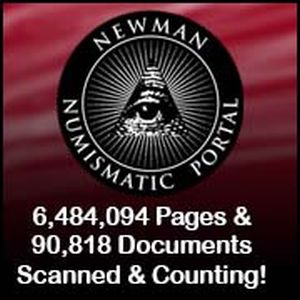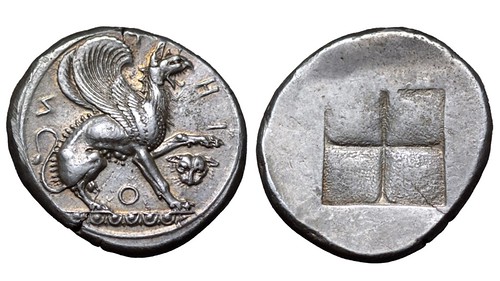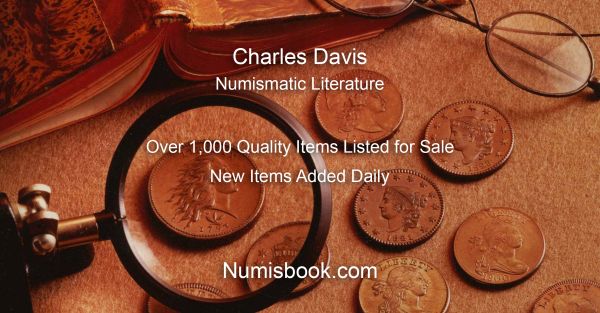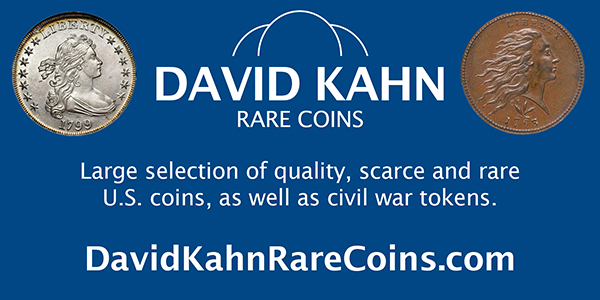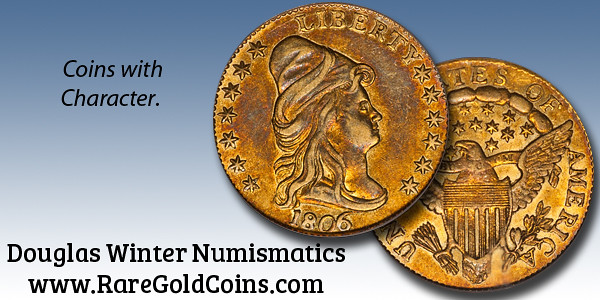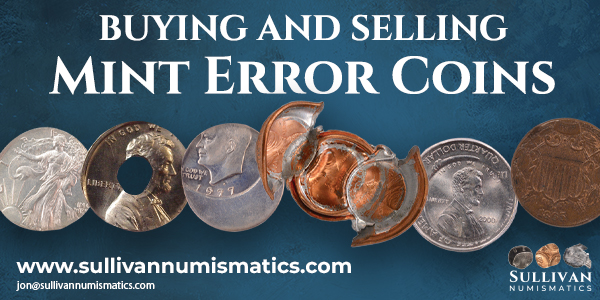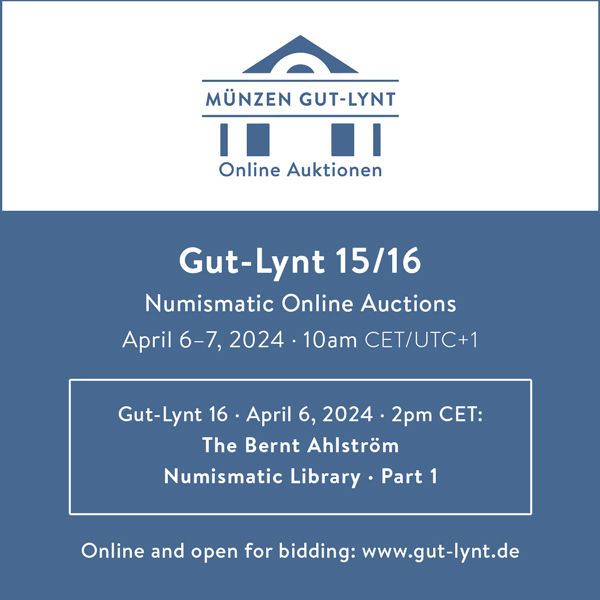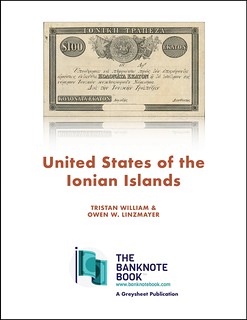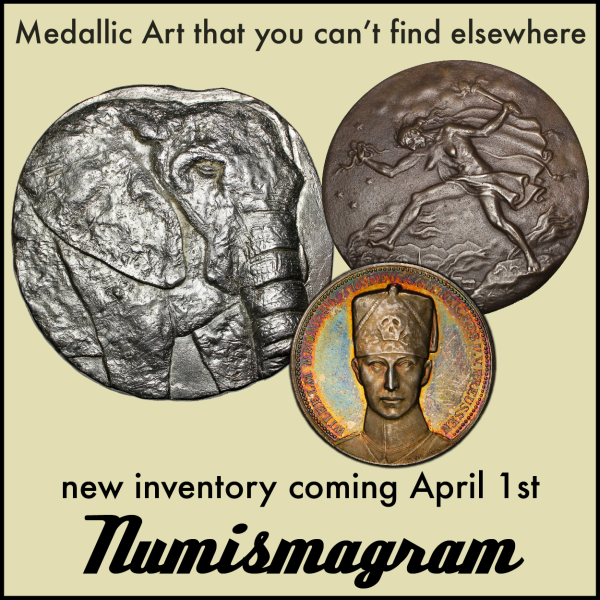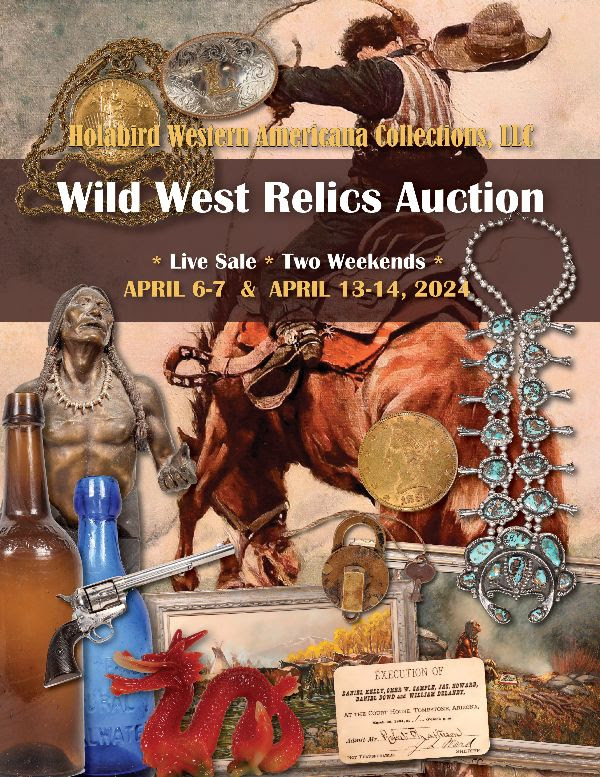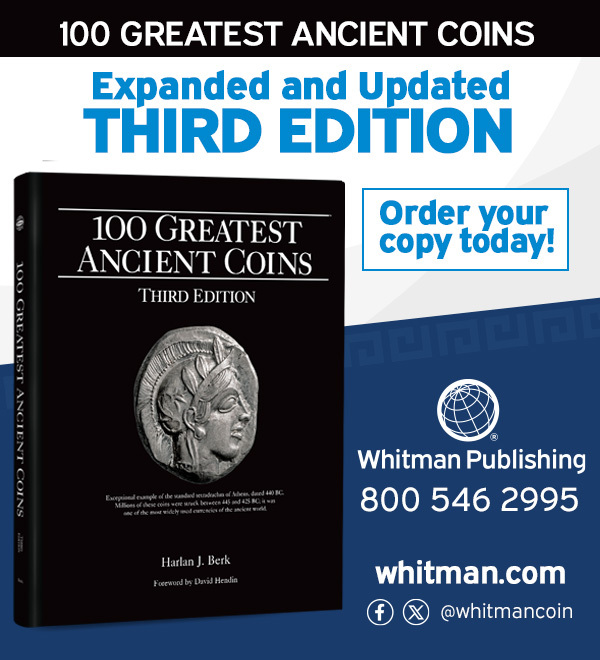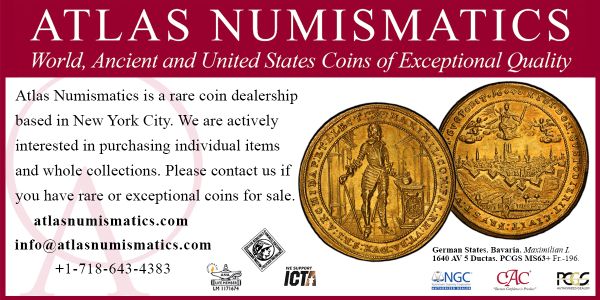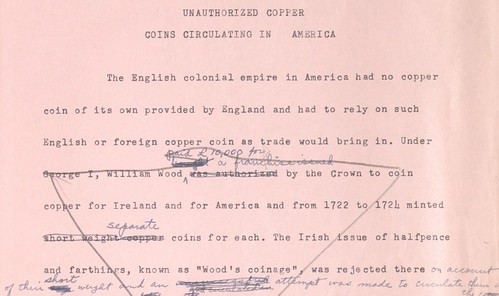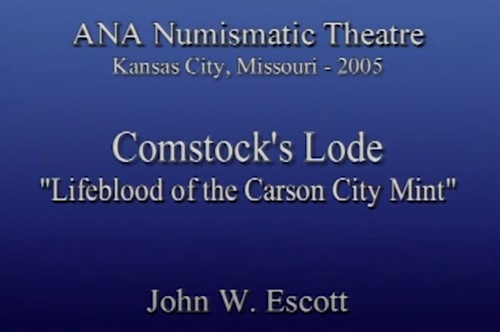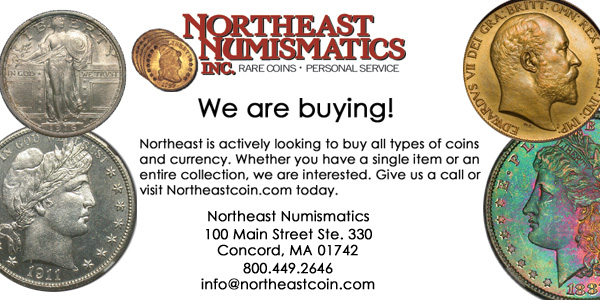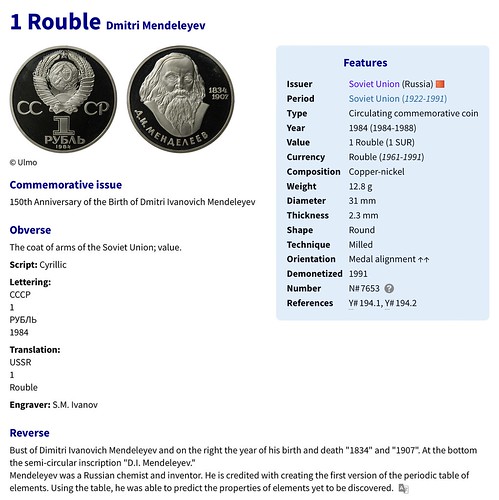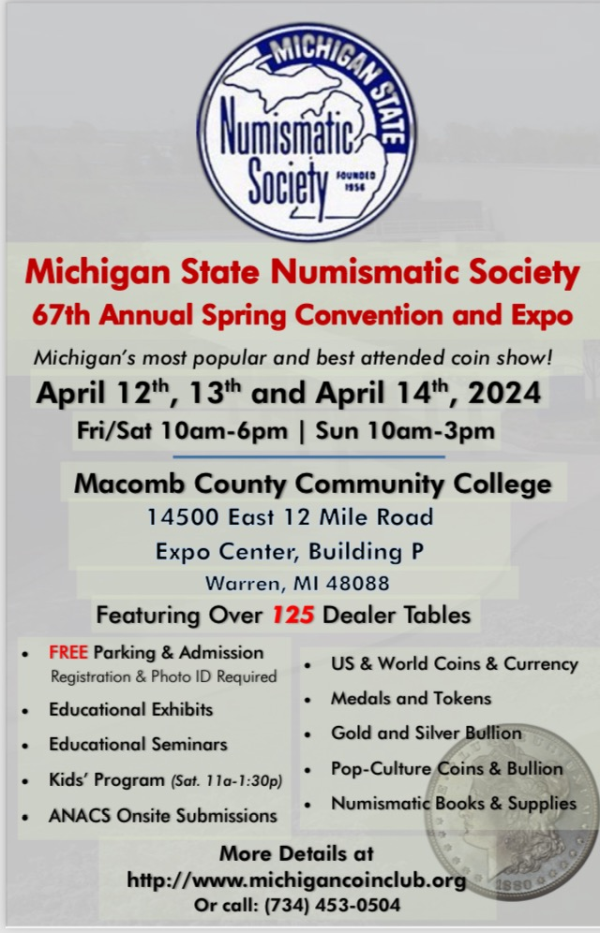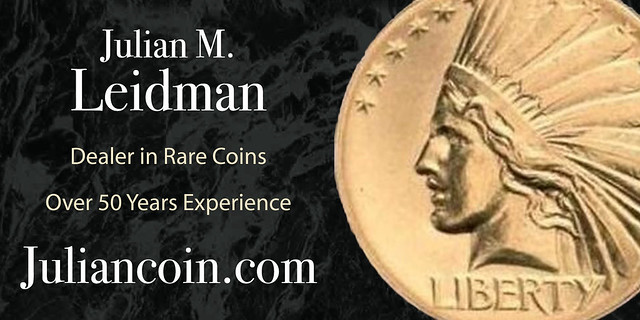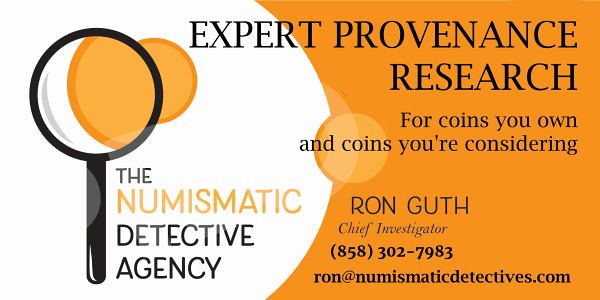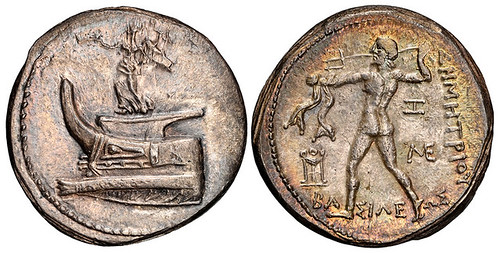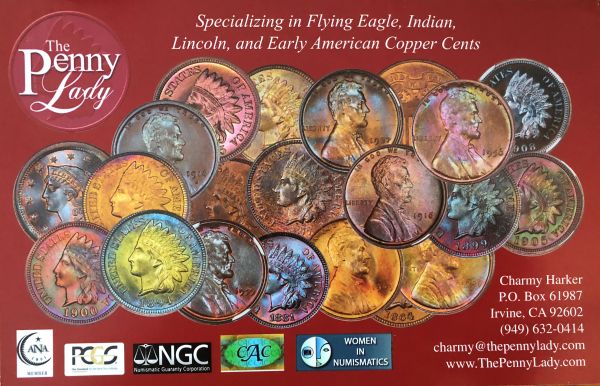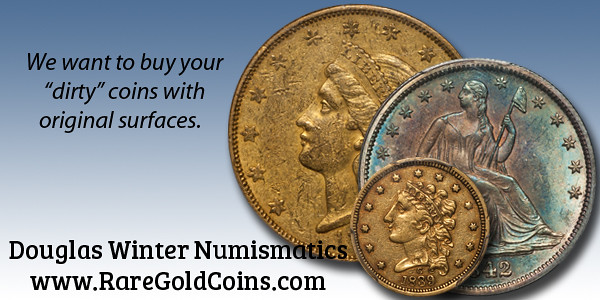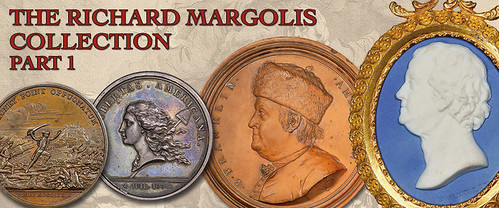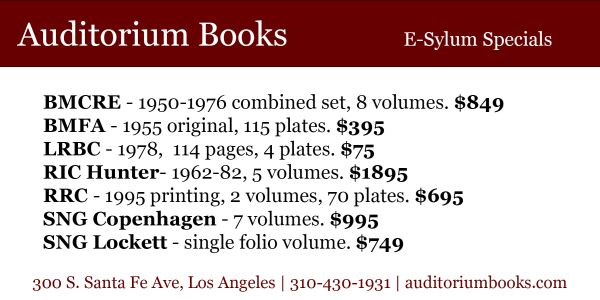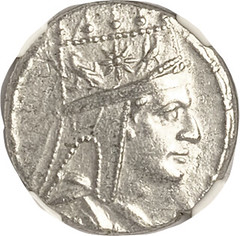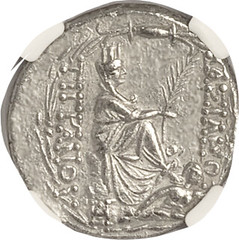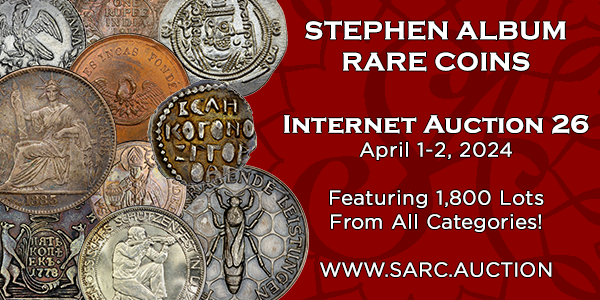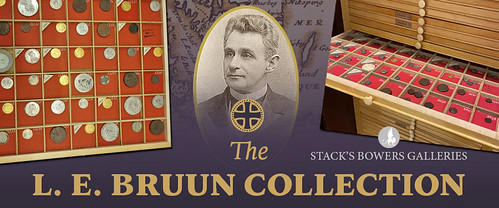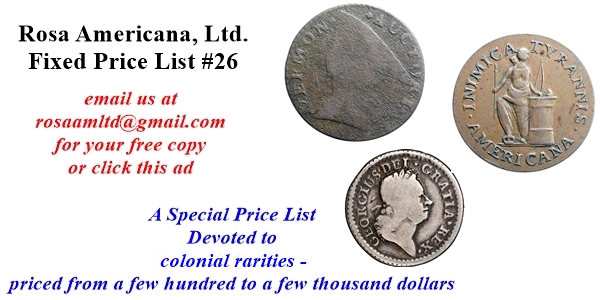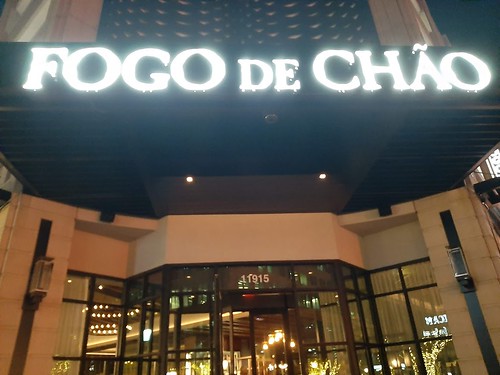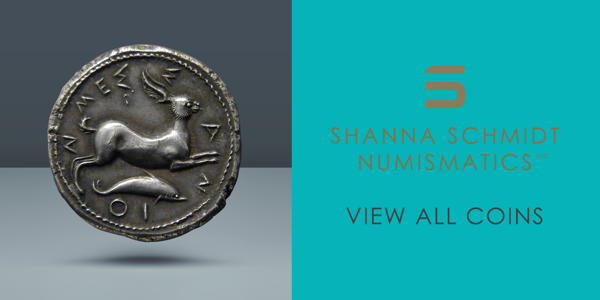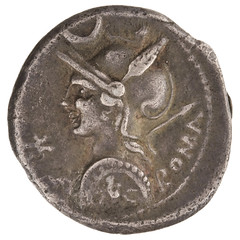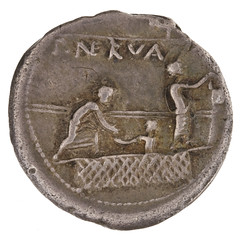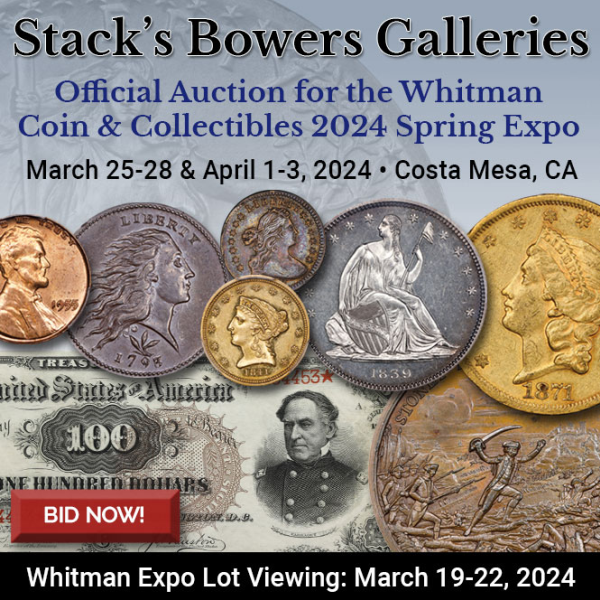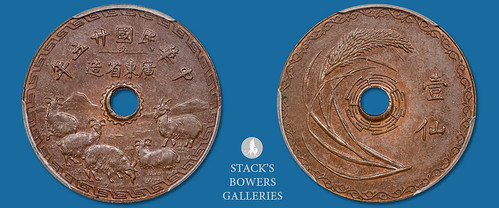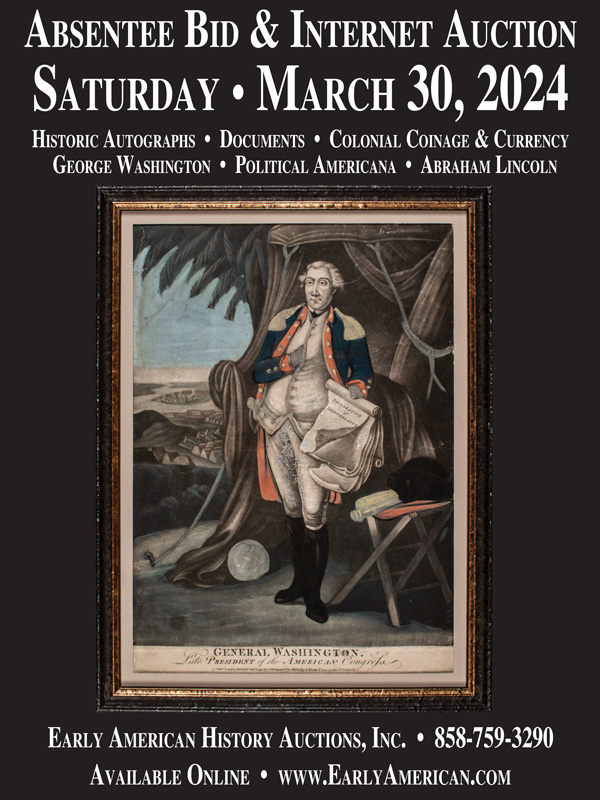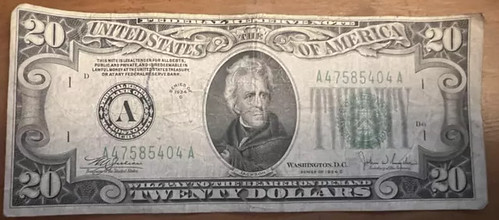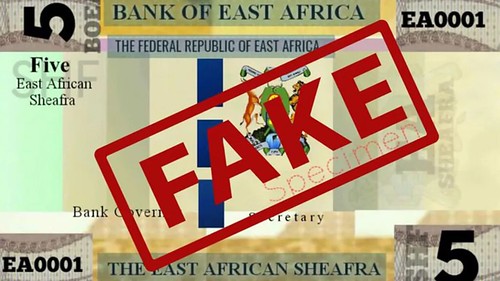
Visit our NBS Sponsors




About UsThe Numismatic Bibliomania Society is a non-profit association devoted to the study and enjoyment of numismatic literature. For more information please see our web site at coinbooks.org SubscriptionsThose wishing to become new E-Sylum subscribers (or wishing to Unsubscribe) can go to the following web page link MembershipThere is a membership application available on the web site Membership Application To join, print the application and return it with your check to the address printed on the application. Print/Digital membership is $40 to addresses in the U.S., and $60 elsewhere. A digital-only membership is available for $25. For those without web access, write to: Jeff Dickerson, Treasurer AsylumFor Asylum mailing address changes and other membership questions, contact Jeff at this email address: treasurer@coinbooks.org SubmissionsTo submit items for publication in The E-Sylum, write to the Editor at this address: whomren@gmail.com BUY THE BOOK BEFORE THE COINSale CalendarWatch here for updates! |
- WAYNE'S WORDS: THE E-SYLUM MARCH 24, 2024
- NEW BOOK: WONDERS OF MORGAN DOLLARS
- NEW BOOK: NUMISMATOGRAPHY (ANCIENT INDIAN)
- NEW BOOK: KAKATIYA COINS
- NEW BOOK: GUERNSEY PAPER MONEY
- BANKNOTE BOOK IONIAN ISLANDS CHAPTER PUBLISHED
- ORIENTAL NUMISMATIC SOCIETY SPRING 2024
- RICHARD V. PUNCHARD (1932-2024)
- ROGER PFUND (1943-2024)
- NEWMAN PAPERS ON COUNTERFEIT HALFPENCE
- VIDEO: COMSTOCK'S LODE
- ROBOTS WRITING COIN CATALOGS
- MORE CHEMISTRY ON COINS
- NOTES FROM E-SYLUM READERS: MARCH 24, 2024
- MORE CHOPS ON MODERN U.S. PAPER MONEY
- CHICAGO COIN CLUB MEETS AT S&S LIBRARY
- VOCABULARY TERMS: PHOTOETCHED, PHOTOETCHING
- ATLAS NUMISMATICS SELECTIONS: MARCH 24, 2024
- ON THE RICHARD MARGOLIS COLLECTION
- FRANK S. ROBINSON 124TH AUCTION
- THE BRUUN COLLECTION OF WORLD COINS
- WAYNE'S NUMISMATIC DIARY: MARCH 24, 2024
- BALLOT BOX ON ROMAN COIN
- GRIFFINS ON ANCIENT COINS
- THE KWANGTUNG “FIVE GOATS” CENT PATTERN
- WWII GHOST ARMY CONGRESSIONAL GOLD MEDAL
- SERIES 1934 C $20 BILL TURNS HEADS
- THE EAST AFRICAN FIVE SHEAFRA
Content presented in The E-Sylum is not necessarily researched or independently fact-checked, and views expressed do not necessarily represent those of the Numismatic Bibliomania Society.
WAYNE'S WORDS: THE E-SYLUM MARCH 24, 2024
 Thank you for reading The E-Sylum. If you enjoy it, please send me the email addresses of friends you think may enjoy it as well and I'll send them a subscription. Contact me at whomren@gmail.com anytime regarding your subscription, or questions, comments or suggestions about our content.
Thank you for reading The E-Sylum. If you enjoy it, please send me the email addresses of friends you think may enjoy it as well and I'll send them a subscription. Contact me at whomren@gmail.com anytime regarding your subscription, or questions, comments or suggestions about our content.
This week we open with five new books, one periodical, two obituaries, updates from the Newman Numismatic Portal, and more.
Other topics this week include robots writing coin catalogs, chemistry on coins, chops on paper money, fixed price and auction offerings, the Bruun collection of world coins, griffins, the ghost army, and the East African five sheafra note.
To learn more about Morgan dollars, Guernsey paper money, Dick Punchard, Roger Pfund, counterfeit halfpence, the Comstock Lode, the plated Mougey sale, the S&S Library, photoetched medals, the Ricketts's Circus token, and the “Five Goats” pattern, read on. Have a great week, everyone!
Wayne Homren
Editor, The E-Sylum
NEW BOOK: WONDERS OF MORGAN DOLLARS
Here's the announcement of a new book on Morgan Dollars by Leroy Van Allen. -Editor
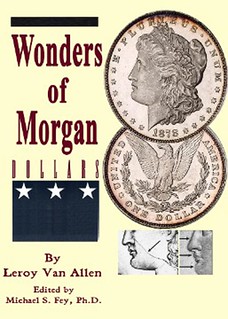 Wonders of Morgan Dollars
Wonders of Morgan Dollars
by Leroy C. Van Allen (Author), Michael Fey (Editor)
Format: Kindle Edition
This is to announce that the Wonders of Morgan Dollars by Leroy Van Allen is now in digital form on Amazon Kindle for only $9.95. It was edited by Michael S. Fey, Ph.D.
This is one of Van Allen's best references showing all the things that can differentiate common silver dollars from rare die varieties and errors. Indeed, you will be treated to numerous instances of die varieties features along with copious pictures illustrating the differences between the variety/error and a normal Morgan silver dollar. It features the authorization history, its appearance and availability among Morgan silver dollars as well as the history of famous hoards.
NEW BOOK: NUMISMATOGRAPHY (ANCIENT INDIAN)
A new book by Shankar Goya has published a new book on the historiography of ancient Indian coinages. -Editor
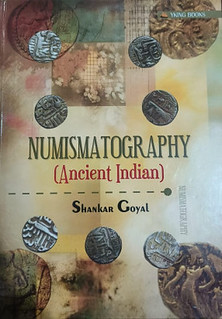 Numismatography (Ancient Indian)
Numismatography (Ancient Indian)
Shankar Goya;
The study of ancient Indian coins is now a well established discipline with a history of more than two centuries behind it. But strangely no work on its historiography has so far been published. The present full-length monograph on this subject is a pioneering study. It critically examines all the important works and research articles published during the last two hundred years or so.
Divided into eleven chapters it begins with the progress of the study of the problems of the origin and antiquity of coinage in india (ch. one) and is followed by the historiography of PMC, Local and Tribal Coins, Indo-Greek Coinage, Coinages of the Imperial Scythians and Pahlavas and the Western Kshatrapas and the Coinage of the Kushanas (chs. second to sixth). Then in the next four chs. the numismatography of the Satavahanas , the Guptas, the Vakatakas and the post-Gupta dynasties has been discussed. In the last and concluding ch. some miscellaneous aspects of ancient Indian numismatics, not covered in the study of the coins of various periods and dynasties, have been examined. Thus this monograph is at once a pioneering and comprehensive study of the historiography of ancient Indian numismatics.
NEW BOOK: KAKATIYA COINS
The Spring 2024 issue of the Journal of the Oriental Numismatic Society includes a review of this new book by Deme Raja Reddy. Here's some information from the publisher. -Editor
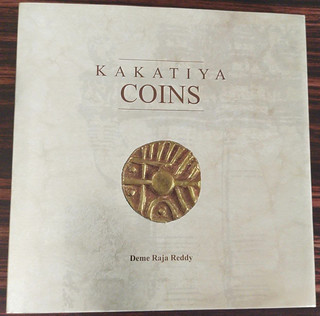 Step back in time to the medieval era of Deccan, India with "Kakatiya Coins: A Journey Through Medieval Deccan Numismatics." This comprehensive book takes readers on an enriching expedition through the fascinating world of coins minted during the Kakatiya dynasty, a prominent South Indian dynasty that ruled from the 12th to the 14th century. Delve into the captivating history, art, and culture of the Kakatiya dynasty through the lens of their coinage. The book offers a meticulous exploration of the coins issued by the Kakatiya rulers, showcasing their various denominations, types, inscriptions, and artistic motifs. From gold, silver, and copper coins to unique bull-and-horseman, stylized lions, and other intriguing designs, the coins of the Kakatiya dynasty reveal a rich tapestry of the dynasty's economic and cultural heritage.
Step back in time to the medieval era of Deccan, India with "Kakatiya Coins: A Journey Through Medieval Deccan Numismatics." This comprehensive book takes readers on an enriching expedition through the fascinating world of coins minted during the Kakatiya dynasty, a prominent South Indian dynasty that ruled from the 12th to the 14th century. Delve into the captivating history, art, and culture of the Kakatiya dynasty through the lens of their coinage. The book offers a meticulous exploration of the coins issued by the Kakatiya rulers, showcasing their various denominations, types, inscriptions, and artistic motifs. From gold, silver, and copper coins to unique bull-and-horseman, stylized lions, and other intriguing designs, the coins of the Kakatiya dynasty reveal a rich tapestry of the dynasty's economic and cultural heritage.
Featuring stunning photographs, detailed descriptions, and historical insights, this book is a treasure trove for numismatists, history enthusiasts, and collectors alike. Learn about the diverse coinage system of the Kakatiyas, their trade relations, and the evolving coin designs that reflect the dynasty's rise and fall. Unravel the mysteries of minting techniques, legends, and symbols, and gain a deeper understanding of the socio-political landscape of medieval Deccan.
NEW BOOK: GUERNSEY PAPER MONEY
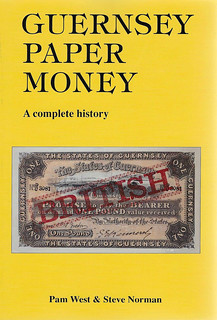
A new book by Pam West and Steve Norman on Guernsey paper money has been published. -Editor
- Guernsey Paper Money catalogue
- 488 full colour priced pages
- many previously unseen banknotes
- Printed by Halstan
- Recorded in UK
- PRICE: £25.00 + £5 p&p
For more information, or to order, see:
http://www.britishnotes.co.uk/?page=stock_item&categoryid=18&stockid=75895
BANKNOTE BOOK IONIAN ISLANDS CHAPTER PUBLISHED
A new chapter of The Banknote Book has been published by Whitman-CDN. Written by Tristan William and Owen Linzmayer, the 7-page catalog covers 49 varieties of notes from the Ionian Bank from 1840 – 1890. -Editor
ORIENTAL NUMISMATIC SOCIETY SPRING 2024
The Spring 2024 issue of the Journal of the Oriental Numismatic Society has been published. -Editor
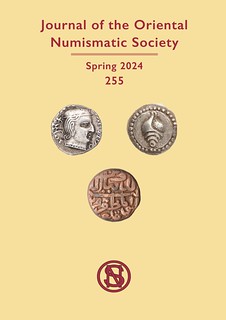 Journal of the Oriental Numismatic Society
Journal of the Oriental Numismatic Society
Spring 2024
CONTENTS
Editorial
Paula Turner
A Hoard Parcel of Early Elymaean and Parthian Bronze Coins
Anran Mao, Patrick Pasmans and Haoyu Sun
A Unique City State Coin from Punjab
Gurcharn Singh
Examining the Historical Significance of a Newly Discovered Coin of Western Ksatrapa Prthivisena
Aditya Ashtekar
Mainland Southeast Asia’s Foundational Coinage: Observations on conch/srivatsa, class A coins (Mahlo 15) from southern Myanmar (Burma)
Robert S. Wicks
Gold Coins of the Hindu Srhi King Bhimadeva
Shailendra Bhandare
An Enigmatic Coin: A paisa of Sher Shah Suri?
Aman ur Rahman
Helen Wang: An appreciation Joe Cribb
ONS News
Book reviews and notices
RICHARD V. PUNCHARD (1932-2024)
E-Sylum Feature Writer and American Numismatic Biographies author Pete Smith submitted this remembrance of Dick Punchard. Thanks! -Editor
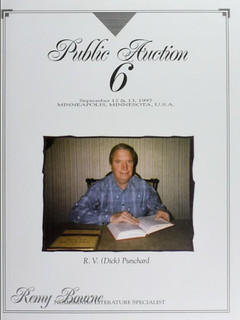 On November 6, 1976, I bought a 1793 large cent (Sheldon 11-c) at a local coin show. The dealer
asked me if I knew the guy carrying the book. He described the man as always carrying a copy of
Penny Whimsy at coin shows. He assembled much of his collection by finding unattributed
varieties. I found that man and introduced myself. He was Dick Punchard.
On November 6, 1976, I bought a 1793 large cent (Sheldon 11-c) at a local coin show. The dealer
asked me if I knew the guy carrying the book. He described the man as always carrying a copy of
Penny Whimsy at coin shows. He assembled much of his collection by finding unattributed
varieties. I found that man and introduced myself. He was Dick Punchard.
I showed the coin to Dick and he asked me if I was a member of Early American Coppers. I was not. He said that he invited members to his home, and if I joined, he would invite me. It took a while but my name was proposed for membership in the November 1978 issue of Penny-Wise. My first EAC convention was in January 1979 in Cocoa Beach, Florida.
ROGER PFUND (1943-2024)
Swiss banknote artist Roger Pfund has passed. -Editor
In Switzerland Roger Pfund is perhaps best known for his innovative, colourful designs for the Swiss passport, introduced in 2003. His idea was for each of the 26 cantons to have its own page with a coat of arms and a landmark.
But his speciality was banknotes, both Swiss and foreign. His modern use of colour, traditional images and computer technology ushered in a new era for currency design.
NEWMAN PAPERS ON COUNTERFEIT HALFPENCE
Newman Numismatic Portal Project Coordinator Len Augsburger provided the following report. Thanks. -Editor
The Newman Papers on Counterfeit Halfpence
Concluding tomorrow (March 25), Heritage Auctions is presenting Selections from the Eric P. Newman Correspondence Files, an offering of 97 lots of research papers on various topics. Lots 52021-52024 highlight Newman’s work on counterfeit halfpence, including the Machin’s Mills coinage. Newman had a strong interest in both colonial coinage and counterfeits, and the intersection of the two topics clearly enjoyed much of his attention. Still, the counterfeit halfpence represented Newman’s “white whale,” a subject that greatly interested him but never led to a broad, definitive publication.
VIDEO: COMSTOCK'S LODE
The David Lisot Video Library on the Newman Numismatic Portal can be found at:
https://nnp.wustl.edu/library/multimediadetail/522852
We highlight one of his videos each week in The E-Sylum. Here's one from 2005 about silver mining and the Comstock Lode. -Editor
ROBOTS WRITING COIN CATALOGS
In his blog The Rational Optimist, Frank Robinson discusses artificial intelligence and its use in numismatic cataloging. -Editor
 The core shtick of Artificial Intelligence (AI) is writing, and it’s widely taking that over from humans. This was part of the story with the recent Hollywood writers strike. Amazon now limits how many books an author can post per day. Because people are using AI to write them — producing books in seconds.
The core shtick of Artificial Intelligence (AI) is writing, and it’s widely taking that over from humans. This was part of the story with the recent Hollywood writers strike. Amazon now limits how many books an author can post per day. Because people are using AI to write them — producing books in seconds.
I also write my coin auction catalogs, briefly describing the items and their quality. Trying to inject occasional humor, I thought to have one entry written by ChatGPT. Given just my barebones listing, it went to town!
MORE CHEMISTRY ON COINS
Last week David Levy asked about coins showing chemical elements or chemistry concepts. Here's what readers came up with. Pabitra Saha offered this Russian 1 Rouble picturing chemist and periodic table inventor Dimitri Mendeleyev. -Editor
NOTES FROM E-SYLUM READERS: MARCH 24, 2024
Numismatic Theater
Roger Siboni writes:
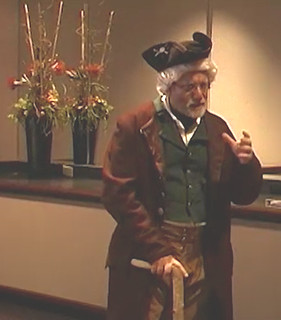 "Don Kagin is certainly a big personality in numismatics. But I think his Colonial Man is his theatrical apex. I have seen him perform this several times modifying it here and there for the right theme. Coinage, paper money, Mass Silver etc.
"Don Kagin is certainly a big personality in numismatics. But I think his Colonial Man is his theatrical apex. I have seen him perform this several times modifying it here and there for the right theme. Coinage, paper money, Mass Silver etc.
"I once asked him to perform this at one of our earlier C-4 Conventions and he made a cross country trip (on his own Shilling) to Boston to bring down the house.
"I have seen Dave Menchell do a few very humorous and clever Colonial related skits. But it seems to be a dying art in numismatics. I think Don also does one for Pioneer Gold. Are there others out there currently? A really fun way to educate and experience the mixed talents of our numismatic colleagues."
I've seen Don's "Oldest Living Pioneer" skit, and thought it was marvelous. Pat McBride brings Ben Franklin to life at coin shows around the country, with portrayers of Washington and Lincoln on hand as well. Here's hoping some of the younger generation of numismatists take up this mantle going forward. C'mon, it's fun! -Editor
To read the earlier E-Sylum article, see:
VIDEO: DONALD KAGIN AS COLONIAL MAN
(https://www.coinbooks.org/v27/esylum_v27n11a11.html)
Other topics this week include the plated Mougey sale, and Sanborn Fire Insurance Maps. -Editor
MORE CHOPS ON MODERN U.S. PAPER MONEY
Kavan Ratnatunga of Sri Lanka writes:
"I withdrew some US$ from the bank for travel and found these chop marks.
"There were notes from 2009A, 2013, and 2017A. However, all but one of these chops were on 2009A notes and the other from 2013. So perhaps the chop is no longer used or the newer notes have not circulated enough to pick up a chop.
"I was prevented from scanning them by the Cannon LIDE 300."
Thanks! Here are the chop images Kavan was able to provide. Great variety. -Editor
THE BOOK BAZARRE
CHICAGO COIN CLUB MEETS AT S&S LIBRARY
This press release from the Chicago Coin Club describes the group's recent meeting at the S & S Library, hosted by member Shanna Schmidt. -Editor
 The Chicago Coin Club embarked on a field visit for their March 2024 meeting attending a presentation by club member Shanna Schmidt at the offices of Shanna Schmidt Numismatics Inc. It was a full house for Shanna’s presentation on “The S & S Library, The Formation of a Numismatic Library.” As the saying goes, “buy the book before the coin,” the favorite companion to any coin collection is owning books that provide a solid understanding of the collection. Most numismatists over time had some semblance of a library to reference coins, find pedigrees, or simply learn more about their origin. The S&S Library is the result of eight years of cooperation. Shanna’s presentation laid out the assembling of the library, why it was created, and future ideas for its use. Club members spent time before and after the meeting viewing the stacks of historic books and catalogs finding publications dating back hundreds and hundreds of years.
The Chicago Coin Club embarked on a field visit for their March 2024 meeting attending a presentation by club member Shanna Schmidt at the offices of Shanna Schmidt Numismatics Inc. It was a full house for Shanna’s presentation on “The S & S Library, The Formation of a Numismatic Library.” As the saying goes, “buy the book before the coin,” the favorite companion to any coin collection is owning books that provide a solid understanding of the collection. Most numismatists over time had some semblance of a library to reference coins, find pedigrees, or simply learn more about their origin. The S&S Library is the result of eight years of cooperation. Shanna’s presentation laid out the assembling of the library, why it was created, and future ideas for its use. Club members spent time before and after the meeting viewing the stacks of historic books and catalogs finding publications dating back hundreds and hundreds of years.
VOCABULARY TERMS: PHOTOETCHED, PHOTOETCHING
Here's another entry from Dick Johnson's Encyclopedia of Coin and Medal Terminology. -Editor
Photoetched, Photoetching. Etching from a master that is a black and white print whose design is a drawing and lettering that is typeset or drawn. Photoetched medals are flat two-dimensional designs (biplanar), sometimes made of two separate thin disks soldered to form a two-sided medal. In other instances a thicker piece of sheet bronze (or white metal) is photochemically engraved on both sides for obverse and reverse designs, but this must be done in very close register. This process is mechanical form of relief etching.
ATLAS NUMISMATICS SELECTIONS: MARCH 24, 2024
Atlas Numismatics has updated their website with 268 new coins, medals, and tokens at fixed prices. Selections include the following items. -Editor
1078003 | GREEK. KINGDOM OF MACEDON. Demetrios I Poliorketes. (King, 306- 283 BC). Struck circa 294-293 BC. AR Tetradrachm. NGC MS (Mint State) Strike 5/5 Surface 5/5. Amphipolis mint. 25mm. 17.22gm. Nike standing left on prow of galley left, blowing trumpet she holds in her right hand and cradling stylis in her left arm / BA- SI?E-OS ?HMHTPIOY. Poseidon Pelagaios, nude, standing left, seen from behind, preparing to throw trident held aloft in his right hand, chlamys draped over extended left arm; tripod to left; to right, Z above ME monogram. Newell 94 (dies LXXXV/– [obv. die unlisted for issue, rev. die not known]); HGC 3, 1012f; Triton XXIV, lot 482 (same dies); Triton XXIII, lot 223 (same dies); Triton XIX, lot 102 (same dies); Triton XVII, lot 164 (same dies); CNG 106, lot 220 (same dies).
Beautifully toned.
$14,950
ON THE RICHARD MARGOLIS COLLECTION
Stack's Bowers Senior Numismatist Greg Cohen published an article this week with a nice overview of the Richard Margolis collection. -Editor
Normally, this U.S. Coin of the Week space is reserved for a specific highlight; this week is different, as I take the time to do a walk through of the Richard Margolis Collection, Part I. By the time you peruse the 243 lots crossing the auction block in this session, you will note that this is something truly spectacular. The term “once in a lifetime” is such a cliché, that in many cases, it has no meaning at all. However, an offering like the Richard Margolis Collection, which took a lifetime to create, is truly a once in a lifetime opportunity for serious numismatists and historians.
FRANK S. ROBINSON 124TH AUCTION
Here's the announcement for dealer Frank S. Robinson's April 23, 2024 sale. -Editor
Dealer Frank S. Robinson will conduct his 124th mail and internet auction of Ancient and Early Coins with a closing date of April 23. The sale will include 585 lots, low minimum bids, and bids to be reduced as competition permits. Robinson notes that reductions have averaged 15-20% in his recent sales. There is no buyer fee.
Featured in this sale is a further segment of a major collection of Judaean and Judaic related material, including some rare and important items, such as a Bar Kokhba Zuz with grapes/lyre in AEF.
THE BRUUN COLLECTION OF WORLD COINS
This announcement from Stack's Bowers Galleries previews their upcoming sale of the Bruun collection of some 20,000 world coins. Amazing. -Editor
Stipulated by Bruun’s Will to Be Sold at Public Auction a Century After His 1923 Death
In a much-anticipated event a century in the making, the extraordinary coin, medal, banknote, and book collection of Danish industrialist Lars Emil Bruun (1852-1923) is finally set to be sold in a series of auctions spanning several years. Commencing in fall 2024, Stack’s Bowers Galleries will present at public auction this prized collection of Scandinavian coinage.
WAYNE'S NUMISMATIC DIARY: MARCH 24, 2024
 Tuesday, March 19, 2024 brought the monthly dinner of my Northern Virginia Numismatic Social group Nummis Nova. Eric Schena was our host. Inspired by a great experience at the Token and Medal Society banquet at the Pittsburgh ANA last year, he'd made a reservation at the Reston Fogo de Chão Brazilian Steakhouse.
Tuesday, March 19, 2024 brought the monthly dinner of my Northern Virginia Numismatic Social group Nummis Nova. Eric Schena was our host. Inspired by a great experience at the Token and Medal Society banquet at the Pittsburgh ANA last year, he'd made a reservation at the Reston Fogo de Chão Brazilian Steakhouse.
BALLOT BOX ON ROMAN COIN
This article discusses voting in Roman times as depicted on a coin, whose image was provided by the American Numismatic Society. -Editor
This silver denarius, minted over 2,000 years ago, is hardly the most attractive Roman coin. And yet, the coin is vital evidence for the early stages of a political struggle that culminated in Caesar’s assassination and the fall of the Roman Republic.
I first encountered this coin while studying Roman history in graduate school. Its unusual design gave me pause – this one depicted figures walking across a narrow bridge and dropping something into a box. I moved on after learning it depicted voting, reasoning that Roman mint officials occasionally made idiosyncratic choices.
GRIFFINS ON ANCIENT COINS
Mike Markowitz published a CoinWeek article about griffins on ancient coins. Great topic! Here's an excerpt - see the complete article online. -Editor
THE GRIFFIN (gryps in Greek) IS a mythical beast with the head and wings of an eagle and the body of a lion. Long before the emergence of coinage in the seventh century BCE, griffins featured prominently in the art of ancient Greeks, Egyptians, Babylonians, and other peoples. As guardians of treasure, griffins were a particularly appropriate symbol for coins, and they appeared very early in numismatic history. A griffin adorns the reverse of the current record holder for the highest price ever paid for an ancient coin.
THE KWANGTUNG “FIVE GOATS” CENT PATTERN
Stack's Bowers Numismatist Nicholas Fritz published an article about a rare Chinese pattern coin, the Kwangtung “Five Goats” piece. -Editor
In the classic Chinese coin series, gold and silver issues often get a disproportionate amount of the shine and collector interest. This, however, distracts from the interesting copper issues of this period. There are copper issues that occasionally reach out and grab attention. To this group, lot 40086, a Kwangtung “Five Goats” Copper Cent Pattern from Year 25 Graded Specimen-64 Brown by PCGS, certainly belongs.
The intriguing motif features five goats grazing on a pastoral landscape, with mountains rising in the background. The reverse provides a simplistic rice stalk, standing in juxtaposition to the intricate and ornate reverse. This Pattern was produced under the aegis of Governor Chen Chi-T’ang, the military ruler of Kwangtung immediately preceding the outbreak of war with Japan. Known as the “celestial king” in the South of China where he held sway, Chen sought to modernize China and introduced schools and universities in Kwangtung. Among the jockeying for power in China and to maintain his position, Chen attempted to balance the Nationalistic Government forces against the growing Communist front. This left him vulnerable, and after his biggest supporter, Hu Hanmin, died in 1936 Chen sought to overthrow the Nationalist government. This was a miscalculation, as the rising Japanese threat led other provincial powerbrokers to align with the government and Chen was forced to flee to Hong Kong.
WWII GHOST ARMY CONGRESSIONAL GOLD MEDAL
Many thanks to the Ghost Army for their important work, and kudos those who championed their medals. Here's an excerpt from a New York Times article about the recent presentation ceremony. -Editor
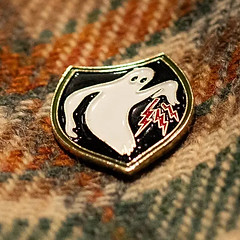 For most of his life, Bernie Bluestein was not allowed to say anything about what he did during World War II in Western Europe.
For most of his life, Bernie Bluestein was not allowed to say anything about what he did during World War II in Western Europe.
Mr. Bluestein was a sophomore at Cleveland School of the Arts in 1943 when he left to join the U.S. Army. He then trained in a secret unit that landed at Normandy, France, shortly after D-Day in June 1944.
“What we did is we attracted the Germans’ attention so that the real units could do whatever they had to do elsewhere,” Mr. Bluestein, age 100, said in an interview.
SERIES 1934 C $20 BILL TURNS HEADS
From Reddit to Newsweek to your E-Sylum comes this story of an old $20 bill that turned heads on social media after being spit out by an ATM. -Editor
An ordinary ATM withdrawal turned into something extraordinary after a Massachusetts man withdrew a $20 bill with a difference.
In a Reddit post shared under the handle IBOB617, a man who told Newsweek his name was Ronald McKernan revealed how a trip to the ATM to pick up some cash to spend on vacation took an unexpected turn.
Looking through the $100 he had withdrawn, McKernan immediately spotted something was amiss. "There was one really old dollar among a bunch of very new ones," he told Newsweek. That "really old" note turned out to be really old indeed, dating all the way back to before 1950.
THE EAST AFRICAN FIVE SHEAFRA
Kavan Ratnatunga passed along this BBC article about a currency hoax that went viral on social media, Thanks! -Editor
To the casual observer, it seemed like the long-cherished dream of a new single currency for East Africa had come to fruition.
An account on X, called "Government of East Africa", complete with a grey tick suggesting it was the real deal, released an image of a specimen note worth five sheafras, featuring a coat of arms and a space for a signature from a central bank governor.
The name sheafra was coined by combining shilling of East Africa and franc - currencies in use in the region.

